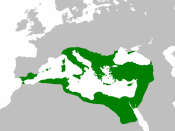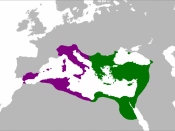The Justinian Code came about when emperor Justinian, or Flavius Petrus Sabbatius Justinianus, decided to codify existing Roman Law, as well as add some of his own. This code had a great effect on the law of the land, and remains as the foundation of law in many western nations to this day. Despite it's effects not being immediate, Justinians administrative genius helped to bring stability to the inconsistent law he inherited from Rome.
In 529 A.D. Tribonian, Justinian's legal minister, led a group of scholars (probably monks) to compile all existing Roman law and rewrite it into something clearer and more absolute. They included not only the official Codex Theodosianus but also many private collections, be they from individual jurists or villages or cities. This is not to be confused with the private collections from which the Codex Theodosianus was itself based on, which were the Codex Gregorianus and the Codex Hermogenianus.
The compiling of laws took 14 months, and the Code made all previous case law from which it was derived no longer binding or viable precedent.
In 533 the Digest was written, and was a summary of the voluminous Code, as well as a guide for judges as to what precedent is to be enforced. This was relevant, as the Code didn't go into case specifics as much as individual cases themselves did, and the Digest pointed judges to which cases could still be used as precedent. The digest also introduced some of Justinian's personal laws as well, which required the Code to be revised. The same year the institutes were written, and were intended to serve as a sort of legal textbook for law students. The excerpts used for the primary source in this presentation are actually from the Institutes.
The effects that the Code,


